Former President Mohamed Nasheed was denied the right to a fair trial ahead of his conviction on terrorism charges in March, the UK’s Bar Human Rights Committee (BHRC) has concluded in its trial observation report.
The BHRC’s findings echo widespread criticism from foreign governments, the UN, and international human rights organisations over the apparent lack of due process in the 19-day trial.
Following its third legal observation mission to the Maldives from February 26 to March 6, the BHRC found that there was “a clear appearance of bias on behalf of two of the three judges, such as to vitiate the fairness of the entire proceedings.”
Two of the three judges presiding over the trial had provided witness statements to the 2012 investigation of the case.
Nasheed was also “deprived, as a self-representing defendant, of adequate time and facilities to prepare his defence,” denied legal representation at the arraignment hearing the day after his arrest, and the criminal court failed to adequately guarantee the right to a public hearing.
The BHRC is an independent body and the international human rights arm of the Bar of England and Wales.
The mission, undertaken by Blinne Ní Ghrálaigh, BHRC vice chair and barrister at Matrix Chambers, assessed the trial on compliance with international fair trial standards, in particular Article 14 of the International Covenant on Civil and Political Rights (ICCPR).
On March 13, Nasheed was found guilty of terrorism and sentenced to 13 years in prison over the military’s detention of criminal court chief judge Abdulla Mohamed in January 2012.
“Serious concerns also arise regarding the unexplained delay of 15 months post-election in pursing criminal proceedings against Mr Nasheed, the overall speed at which the terrorism trial before the criminal court took place, once the new charges were laid, the limited time given to his defence team to prepare and the refusal by the court to permit defence witnesses to be called,” the report stated.
“In light of the above, Mr Nasheed’s conviction cannot properly be regarded as safe.”
The prosecutor general had withdrawn previous charges of illegal detention against Nasheed in early February and pressed terrorism charges on the day of his arrest (February 22). The surprise trial began the next day.
In several recommendations made to the government, the BHRC called for an investigation of “all serious allegations of violations of due process and fair trial rights through independent and impartial processes and hold to account those found responsible for those violations.”
The committee also recommended reforms to “strengthen the independence and impartiality of the judiciary.”
The BHRC advised the government to adopt a new penal code, evidence code, and criminal procedures law to codify fair trial and due process guarantees in the constitution, and “institute mandatory training in fair trial rights and guarantees, including those arising under the ICCPR, for all judges, at all levels of seniority.”
Following international criticism of Nasheed’s conviction, President Abdulla Yameen had called on all parties to respect the criminal court’s verdict.
Meanwhile, during the Maldives’ Universal Period Review in Geneva on May 6, foreign minister Dunya Maumoon claimed that Nasheed chose not to appeal his 13-year sentence and that due process concerns regarding the trial were procedural and not substantive.
Criticism of Nasheed’s trial had “mainly focused on the process and not the merits,” she said.
But Nasheed’s office contends he was deliberately denied the right to appeal after the criminal court failed to provide necessary documentation within the ten day appeal period specified by the Supreme Court.
Amnesty International had meanwhile called Nasheed conviction a “travesty of justice” while the UN human rights chief said the opposition leader was sentenced after a “hasty and apparently unfair trial” and noted “flagrant irregularities.”
The UN special rapporteur on the independence of judges and lawyers noted “serious due process violations” such as denial of the opportunity to present defence witnesses, which led her to believe “the outcome of the trial may have been pre-determined.”

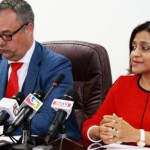
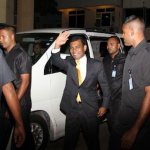
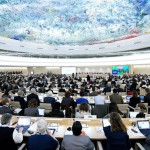
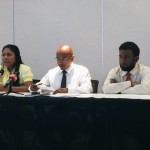
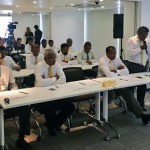
Terrorism, according the definition is use of violence and threats to intimidate or coerce especially for political purpose. I don’t think Abdulla Gazee was political leader who was fighting for freedom of Maldivian from Anni, neither he was taken as hostage at gun point for ransom. Abdulla Gazee was arrested by Maldivian police for alleged national security reasons and if you can implicate arresting people by law enforcement agency is terrorism then the whole Police department and judiciary are terrorist organizations. This kind of breach of human rights by any government by mocking justice and human dignity should not be tolerated and the democratic world should take tuff stance on such crazy people who arrogantly defy international norms because of international laws that respect other people’s freedom. This kind of people are not only dangerous for their own people, such people can go to any extent in violation of international laws. The neighboring India and Sri Lanka can do lot to put pressure on these people by imposing travel ban on the Maldivian government. The Maldivian Government does not have legality as it was formed with coalition and the coalition is already collapsed and 50% of people are on the road denouncing this government. We already see how democratic this government is; they are inching to Pakistan, and China defying democracy, this mean they can even support international terrorist organization and drug loads. We already see this as one of the cabinet minister is alleged gangster suspected with links with international criminals. But he is the most powerful man in the government, and this allegation does not seem wrong accusation as he acts like gangster. The world has responsibility to help those who are fighting to improve human rights and democracy in Maldives. And this is not something difficult, simply impose travel ban on the government official. This action would not be illegal as the current Maldivian government is illegal by all democratic means